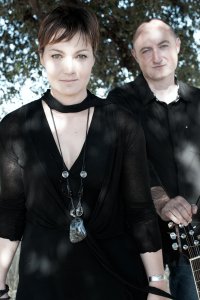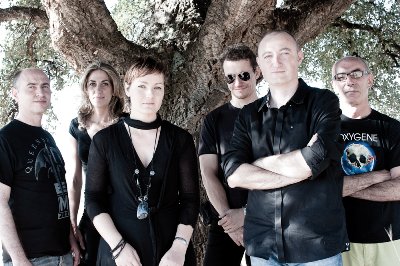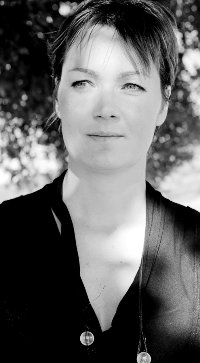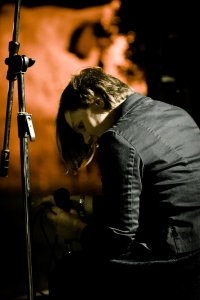 |
Chiara Gironi
(Magnolia)
Musical Discoveries: Chiara, would you tell us a little bit about where you are from and how you got into music?
Chiara Gironi: I was born in Forlì, a small town in the north of Italy, but I moved to Rome with my family when I was six. So I consider Rome like my real hometown. I loved music and I liked singing since I was a child, but I took modern singing lessons beginning when I was fifteen for three years, with the roman jazz singer Cinzia Baldana.
Anyway, I've always preferred rock music. When I was nine, I planned to run away home to go to Milan for Springsteen's Born in the Usa tour. The Boss was a very important presence in my youth. I was captured by his astonishing efficacy as a working-class storyteller and it's thanks to his music that I met one of my best friends, the rock-folk singer Silvio Cancrini, with whom I had the first performing experiences in many Roman squats and pubs.
Please tell us about your musical influences.
Between the age of seventeen and nineteen I had different experiences as a vocalist in rock-blues bands, but I never quit writing songs on my own. My main examples were Bruce, Patti Smith, Janis Joplin, Bono. I was astonished by the emotional power they transmit even more than their technical skills, and I probably loved them so much because their voices sound so different from mine. I think it's quite usual that we often long for things we cannot get.
But I was also deeply influenced by Kate Bush, a complete artist and a woman I'm very fond of. Amongst the female singers, I also like Beth Gibbons of Portishead, Annie Lennox, Tory Amos, Ani di Franco, Beth Hirsh, P.J. Harvey. I remember that when I was a young girl I also liked Shirley Bassey very much.
It would be hard for me to recall a specific influence of a particular artist, on a technical point of view I only took general inspiration because I usually appreciate music in the whole, I'm not necessarily interested in women just because I am. For example, a singer I really appreciate and I feel influenced by is Tom Yorke of Radiohead, a band I like very much). Apart from Radiohead, at the moment my attention is particularly captured by the Gazpacho, Muse, Steven Wilson in the Blackfield project.
What were your experiences with Eclissidra?
 |
Well, it seems to be a long story. It was the autumn of 1994, I was twenth and a student. I was not playing for about a year, and was bored with the usual role of being a blues vocalist in roman pubs. It didn't fit me anymore and I wanted something new, so I thought it was time for me to risk on my own, to play some original music.
I found Eclissidra on a newspaper ad. They were looking for a singer who liked British music. Therefore, while I was thinking about something like The Smiths, Blur, etc., they were thinking about Pink Floyd, Genesis, etc. So, as a matter of fact, it all started with a big misunderstanding! I mean, I'm not the progressive soul of the group, things matched among us in a very strange and somehow funny way! I decided to stay because I really liked Alessandro--who is now our guitarist, but he played the bass then--Donatella, the pianist, and Bruno, the solo guitarist. There was immediately a good human empathy and I understood that we would have become friends.
They had already composed some original music that I found really beautiful, among which there was "Fiori di Pioggia," that was released as the title track of our first EP as Eclissidra in 1995. It was the first lyric I wrote for the band. During the following years, we composed at least two hours of music. We were in a period of great creativity and performed live frequently in the Roman live clubs. In 1997 we won a European Music competition with a track called "Vanno Oltre." In 1998 we recorded a LP In Questo Momento that unfortunately was never edited due to problems with the small production label of that time.
Why was there a long hiatus between the Eclissidra recordings and the new Magnolia album?
After having recorded In Questo Momento, we had another experience with an Italian music manager, who tried to impose changes in our songs and in the members of the band. It was a very deceiving experience, both on a musical and a human point of view. As a matter of fact it was from that moment that we begun to feel that our inspiration was going to exhale.
In 1998 Alessandro and I read about David Hicks' history in a newspaper, and we took further information on his struggle against his destiny of condemned to death penalty in Texas, and on his final defeat. We found it shocking, it made us think more deeply about our opinion on death penalty in general, and about the concept of innocence and guilt. It was not a particularly popular or likeable topic, but it was something strictly concerned to what we wanted to talk about, regardless of what the Italian music business would have thought. This is how we started working on La Zona d'Ombra.
 |
But the next two years seemed to be a peculiar moment in our lives. Alessandro started his new job, so did I; Donatella would have soon left for a job in the United States. The music project seemed too difficult to carry on in a such new situation. We didn't decide to quit, we just gradually did it. But we went on keeping in touch as friends all along these years, hoping to find the right time to start again.
Please tell us all about the making of the new Magnolia album.
Well, when we met again, in the summer of 2010, with the arrival Claudio, our new drummer, none of us wanted to sound like a cover band of Eclissidra. In the meantime, we wanted to discover what we would be able to do after such a long time. We knew that something had been interrupted and we needed to accomplish it.
Seven of the fourteen tracks of the album were almost ready, but they have been rearranged with new sounds, the others are new. The most important difference with the past is our way of recording. Recording on our own allowed a lot of freedom in composition. If you can play and record on your own, then you can do it with a freedom that only new technologies can offer. After each session, we found ourselves talking about the recording and the songs, having dinner together. Supper's ready.
 |
The release of the whole project took one year, with two stops-and-go. Another important element in the work in progress of our musical project has been the cooperation with friends. I mean, without the help and the beautiful work of the people who contributed to its release, La Zona d'Ombra couldn't have been completed.
Valentina Larussa created the album artwork of the album and took our photographs; Giorgio Simbula took the booklet photos and Gianmarco Giudici contributed the cover photo. Gianluca Serratore created the graphicsand Fabrizio Gratti made the videos. Gaetano di Lauro is our web master and with Daniele Fappiano, web creator and other friends are responsible for our online content. The project is actually the result of a work of a group thats not only six musicians. Every member and every friend who contributes to the Magnolia project in general has the same importance. There are no leaders, there are no fans, only friends and cooperators. This is very important for us, it's the main principle of our work, and that's for this reason that we call it "Magnolia Family." Personally, I contributed most of the lyrics.
For those that are not fluent in Italian, would you tell us what La Zona D’Ombra is about?
With pleasure. It's a concept album that tries to describe the most important moments in life and the different, sometimes contrasting feelings of a man condemned to death penalty. It's been inspired by David Hicks’ story, a young black man prosecuted for his grandmother's murder in Texas, who was executed on January 6th, 2000.
The first part of the album ("Non ho," "Lì fuori") focuses on his personal background, made of misery and private violence, and describes the moment of the capture by the police. "Home" is a flashback about a woman from the past, no longer present in his life. "Lettere di Annie" is about a woman, a volunteer not interested if he was innocent or guilty who wrote him in jail to encourage him. "La Gabbia" is a flashback of a childhood marked by violence, that can often generate a violent attitude.
"Piccola ala" is the story of a friendship born in jail. In "Ellis One"--the name of the jail in which Hicks waited for the execution--and in "Corridoi" I tried to communicate the feeling of hopeless isolation associated with the idea of a life spent in prison, when you finally become conscious that looking forward is completely useless, because someone else has already decided your destiny--a State, in the case.
Have you ever considered an English language version of the album?
 |
I wrote the lyrics in Italian because it's my own language. To tell you the truth, until recently I had never considered the possibility that our music could interest not-Italian listeners.
I'm not sure I would be ready to sing in a different language than mine, but I guess it's something I can think about for the future.
What should listeners expect when hearing Magnolia?
Dreaming-like, sometimes melan- cholic atmospheres, a sound that matches melody and rock energy. I suggest that you close your eyes and turn up the volume. I would be glad if anyone listening to our music could find their personal way into our world of sounds, even if they cannot understand the lyrics and, if they want, as some of them already do, write their impressions in our website.Tell us about your live performances.
Perhaps, among the members of Magnolia, I'm the one who mostly longs for performing live. At the same time I'm scared and fascinated by that. Playing live gives me great energy, I consider it the best way to communicate what I need to say through music.
While I'm perfectly conscious about the importance of the internet and other technological tools nowadays to spread music in a wide range, but I grew up in the age of "Live Aid," of such big social and musical events, when the direct contact between the artists and the audience had a great importance. And, as I've already said, I'm a fan of Bruce Springsteen, and I find his physical approach to his listeners as the best. This is my background and I affirm it proudly. Unfortunately, I will never have his charme and energy.
 |
In our live performances I always try to give my best and--a difference with the past--I pay attention to the different elements of the show, such as the use of the changing images behind me, my clothing, the gestures that I try to use as further explanation of what I'm saying and singing.
I also try not to be too present in respect with the other members of the band, because the aim is always to give an idea of harmony and balance among the elements.
At the moment, a tour is not in the plans, although we would like to play live everywhere if we have the chance. We hope to tour next spring and summer. In that occasion we would like to play also new songs from the album we're now starting to work on.
What’s it like being a female recording artist these days?
I really don’t know. Most of my friends are female artists. I personally felt comfortable on recording this album. It is impossible to deny that image is very relevant in the media approach as well as in everyday life. But you can also build your image in an unusual way. I mean that if you have talent and fantasy and personality, your personality can be more interesting and successful than beauty.
What internet resources are important to Magnolia?
For Magnolia, internet is fundamental and a lot of work has still to be done to improve our presence in the web. The inte4rnet has given our music the possibility to be heard in the U.S., South America, Europe and in general out of our home country. Although we sing in Italian, we had a lot of contacts abroad. This completely changed our attitude and our purposes for the future. If you can have an international audience, even if a small one, you have to plan your activity in a different way than in the past, like when we focused on live performances in Rome, for example.
Besides your work with Magnolia, what else rocks your world?
 |
Well, music is my passion but is not my job. I have a degree in History of Art and I work in a Museum.
I really like living in Rome and I'm lucky, I work in the centre of the city, among old monuments, beautiful squares, sumptuous churches.
I'm quite interested in the debates about the critical conditions of Italian artistic and cultural heritage, that should be in my opinion the starting point to increase our economy, the only field, in this moment of great depression, in which it would be possible to create new employ- ment, but that is constantly understated and ignored by our governments.
I spend most of the night at rock gigs. I also like cooking, watching old movies, having fun with friends, spending time with my cat Amélie and with my family. Quite boring. I guess!
|
.: more Magnolia :. Official Website | FaceBook album review: La Zona d'Ombre (2012) interview and HTML © Russell W Elliot 2012 images: © Magnolia 2012 | all photos used with permission Last updated 03 November 2012 |